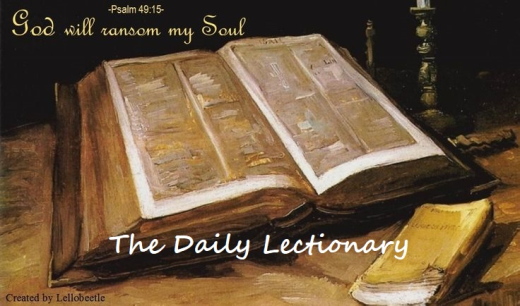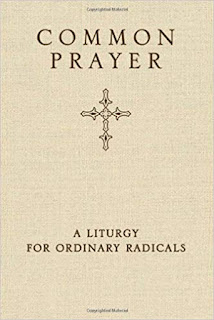The Daily Lectionary
MONDAY, May 11, 2020
Psalm 102:1-17; Exodus 13:17-22; Acts 7:17-40
(Revised Common Lectionary Year A)
Prayer for deliverance
1 Hear my prayer, Lord;
let my cry for help come to you.
2 Do not hide your face from me
when I am in distress.
Turn your ear to me;
when I call, answer me quickly.
3 For my days vanish like smoke;
my bones burn like glowing embers.
4 My heart is blighted and withered like grass;
I forget to eat my food.
5 In my distress I groan aloud
and am reduced to skin and bones.
6 I am like a desert owl,
like an owl among the ruins.
7 I lie awake; I have become
like a bird alone on a roof.
8 All day long my enemies taunt me;
those who rail against me use my name as a curse.
9 For I eat ashes as my food
and mingle my drink with tears
10 because of your great wrath,
for you have taken me up and thrown me aside.
11 My days are like the evening shadow;
I wither away like grass.
12 But you, Lord, sit enthroned forever;
your renown endures through all generations.
13 You will arise and have compassion on Zion,
for it is time to show favor to her;
the appointed time has come.
14 For her stones are dear to your servants;
her very dust moves them to pity.
15 The nations will fear the name of the Lord,
all the kings of the earth will revere your glory.
16 For the Lord will rebuild Zion
and appear in his glory.
17 He will respond to the prayer of the destitute;
he will not despise their plea.
God leads the way
13:17 When Pharaoh let the people go, God did not lead them on the road through the Philistine country, though that was shorter. For God said, “If they face war, they might change their minds and return to Egypt.” 18 So God led the people around by the desert road toward the Red Sea. The Israelites went up out of Egypt ready for battle.
19 Moses took the bones of Joseph with him because Joseph had made the Israelites swear an oath. He had said, “God will surely come to your aid, and then you must carry my bones up with you from this place.”
20 After leaving Sukkoth they camped at Etham on the edge of the desert. 21 By day the Lord went ahead of them in a pillar of cloud to guide them on their way and by night in a pillar of fire to give them light, so that they could travel by day or night. 22 Neither the pillar of cloud by day nor the pillar of fire by night left its place in front of the people.
Stephen addresses the council
7:17 “As the time drew near for God to fulfill his promise to Abraham, the number of our people in Egypt had greatly increased. 18 Then ‘a new king, to whom Joseph meant nothing, came to power in Egypt.’ 19 He dealt treacherously with our people and oppressed our ancestors by forcing them to throw out their newborn babies so that they would die.
20 “At that time Moses was born, and he was no ordinary child. For three months he was cared for by his family. 21 When he was placed outside, Pharaoh’s daughter took him and brought him up as her own son. 22 Moses was educated in all the wisdom of the Egyptians and was powerful in speech and action.
23 “When Moses was forty years old, he decided to visit his own people, the Israelites. 24 He saw one of them being mistreated by an Egyptian, so he went to his defense and avenged him by killing the Egyptian. 25 Moses thought that his own people would realize that God was using him to rescue them, but they did not. 26 The next day Moses came upon two Israelites who were fighting. He tried to reconcile them by saying, ‘Men, you are brothers; why do you want to hurt each other?’
27 “But the man who was mistreating the other pushed Moses aside and said, ‘Who made you ruler and judge over us? 28 Are you thinking of killing me as you killed the Egyptian yesterday?’ 29 When Moses heard this, he fled to Midian, where he settled as a foreigner and had two sons.
30 “After forty years had passed, an angel appeared to Moses in the flames of a burning bush in the desert near Mount Sinai. 31 When he saw this, he was amazed at the sight. As he went over to get a closer look, he heard the Lord say: 32 ‘I am the God of your fathers, the God of Abraham, Isaac and Jacob.’ Moses trembled with fear and did not dare to look.
33 “Then the Lord said to him, ‘Take off your sandals, for the place where you are standing is holy ground. 34 I have indeed seen the oppression of my people in Egypt. I have heard their groaning and have come down to set them free. Now come, I will send you back to Egypt.’
35 “This is the same Moses they had rejected with the words, ‘Who made you ruler and judge?’ He was sent to be their ruler and deliverer by God himself, through the angel who appeared to him in the bush. 36 He led them out of Egypt and performed wonders and signs in Egypt, at the Red Sea and for forty years in the wilderness.
37 “This is the Moses who told the Israelites, ‘God will raise up for you a prophet like me from your own people.’ 38 He was in the assembly in the wilderness, with the angel who spoke to him on Mount Sinai, and with our ancestors; and he received living words to pass on to us.
39 “But our ancestors refused to obey him. Instead, they rejected him and in their hearts turned back to Egypt. 40 They told Aaron, ‘Make us gods who will go before us. As for this fellow Moses who led us out of Egypt—we don’t know what has happened to him!’
Optional parts of the readings are set off in [square brackets.]
The Bible texts of the Old Testament, Epistle, and Gospel lessons are from The Holy Bible, New International Version®, NIV® Copyright ©1973, 1978, 1984, 2011 by Biblica, Inc.® Used by permission. All rights reserved worldwide.
The Daily Lectionary is a three-year cyclical lectionary. We are currently in Year A. Beginning with the first Sunday of Advent in 2020, we will be in Year B. The year which ended at Advent 2019 was Year C. These readings complement the Sunday and festival readings: Thursday through Saturday readings help prepare the reader for the Sunday ahead; Monday through Wednesday readings help the reader reflect and digest what they heard in worship. Revised Common Lectionary Daily Readings, copyright © 2005 Consultation on Common Texts. www.commontexts.org
The Daily Lectionary for MONDAY, May 11, 2020Psalm 102:1-17; Exodus 13:17-22; Acts 7:17-40









